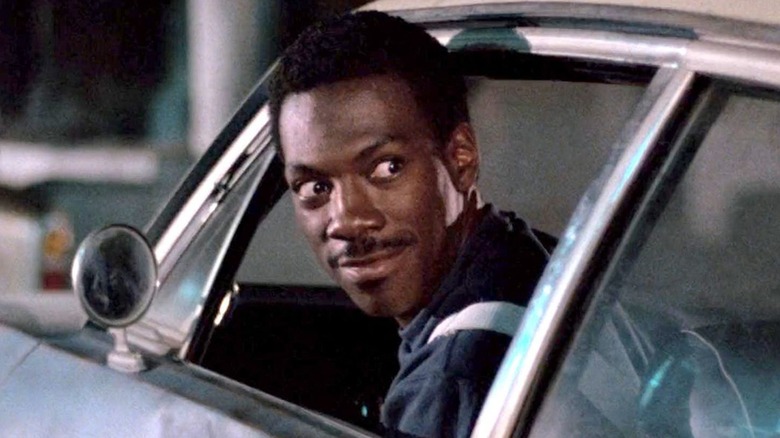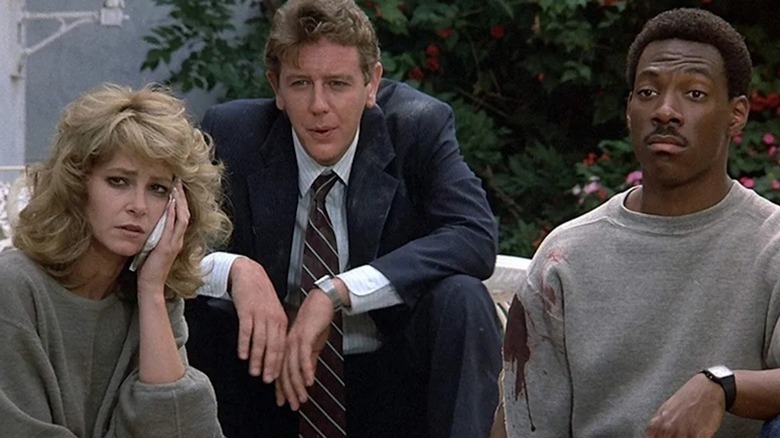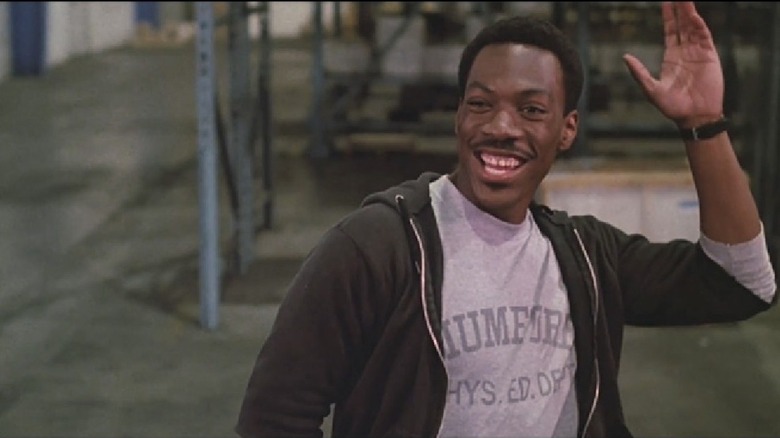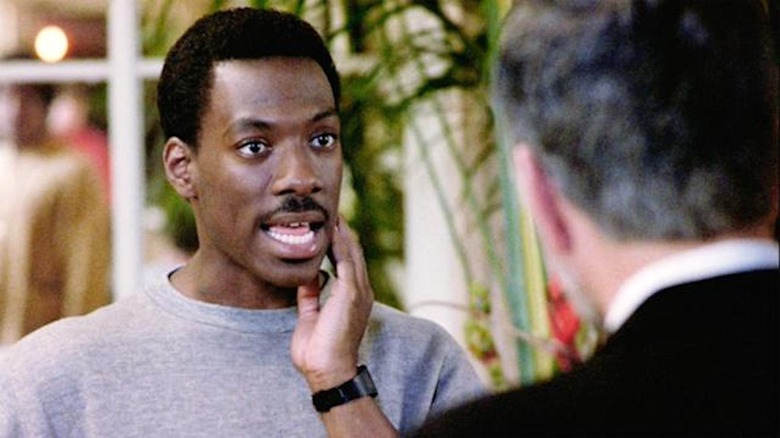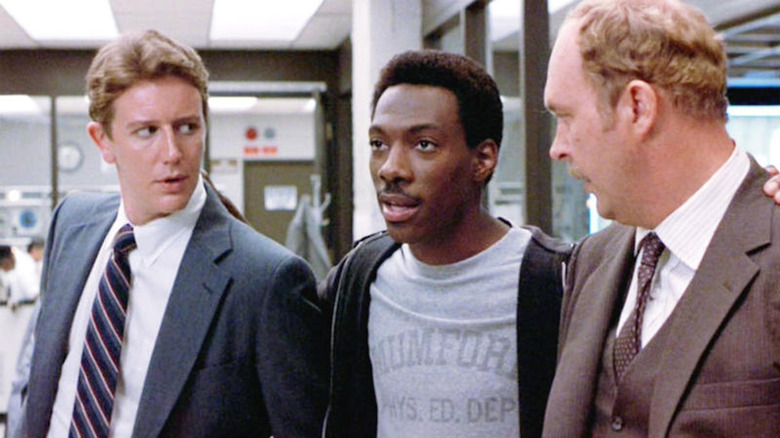Beverly Hills Cop's Script Was In Rough Shape Until Eddie Murphy Arrived
Long before "Beverly Hills Cop" became the highest-grossing R-rated movie of all time (a record the film held for almost 20 years until "The Matrix Reloaded" claimed the crown), it was a problem project for Paramount. Birthed in 1975 by a young studio exec named Michael Eisner, the film was to be a fish-out-of-water actioner about a streetwise Detroit cop who busts up the ritzy Los Angeles neighborhood while trying to track down the murderer of his best friend. The film went through multiple drafts over many years before Daniel Petrie Jr. basically cracked the story in 1983.
Though the project was at last moving forward, something still wasn't right. Producers Don Simpson and Jerry Bruckheimer, red hot off the success of "Flashdance," were now shepherding the movie, and, despite their high studio profile, couldn't get a firm commitment from a leading man. Initially, they wanted Mickey Rourke for the part of Axel Foley, but he grew impatient during the protracted development process and bolted. Finally, Sylvester Stallone, then one of the biggest stars on the planet (riding high off the one-two 1982 combination of "Rocky III" and "First Blood"), signed on. There was just one problem: Sly wanted to take a crack at the screenplay himself.
Sylvester Stallone as a mirthless Axel Foley
Stallone harbored ambitions well beyond movie stardom in 1983, and was already acting on them. He'd written and directed four movies ("Paradise Alley," "Rocky II," "Rocky III" and "Staying Alive"), and, aside from the critical/commercial fiasco of his "Saturday Night Fever" sequel, reasonably believed he knew what was best for his career. Eager to have a greenlit picture, Simpson and Bruckheimer allowed him to reshape Petrie's screenplay to his liking.
According to a 1984 New York Times article on the making of "Beverly Hills Cop," Stallone's take on the material clashed with the producers' shared vision:
"'Sly's rewrite had heart, passion and pathos,' Mr. Simpson said. 'It was superb. It had more edge and more of the blood vengeance motif.' But it didn't have the fish-out-of-water theme or the tension between street-smart and 'by-the-book' police."
Simpson and Bruckheimer preferred Petrie's draft, at which point Stallone exited the project.
Paramount honcho Barry Diller was flummoxed. Two of his brightest protégés had chased a superstar off a potential blockbuster. Who had the kind of commercial cachet to fill that void? How about the "Saturday Night Live" phenom who'd just made two box office hits for the studio? Though "48 Hrs." and "Trading Places" hadn't done "Rocky III" business, they'd proven hugely profitable for Paramount, indicating quite clearly that Eddie Murphy was primed to explode. Simpson made the suggestion, and the boss bit. Per the producer, "Diller took the cigar out of his mouth, took three steps and replied, 'I love it.'"
Eddie Murphy, script doctor
It was at this point that Martin Brest, the wunderkind director who'd followed up the commercial success of 1979's "Going in Style" by getting himself fired off "WarGames," literally lost a coin flip that resulted in him signing on to direct the film. Brest is also a screenwriter, which likely explains his hesitation in taking on a project that had been months away from being a hyper-violent Stallone action flick. He told The New York Times he wasn't happy with any of the drafts, which is not an ideal situation when you're about to spend the next year of your life shooting and editing a major motion picture.
It didn't take long for Brest to realize the slipshod quality of the script wasn't a huge issue. If a scene wasn't working, he had better than an A-list script doctor. He had Eddie.
According to Brest, "It's spooky but every time we got into a jam, I'd turn to Eddie and say, 'Can you come up with something?' And every time, he came up with something that knocked me to the floor. He's a director's dream. He magnifies every bit of work you do by a thousandfold."
Riffing a boilerplate action flick into a bona-fide classic
One such scene involved Foley crashing a private Beverly Hills club to confront murderous art dealer Victor Maitland (Steven Berkoff). Brest didn't like what was on the page, so he consulted his star. Within six seconds, Murphy envisioned Foley's quick-witted deflect — he takes on the persona of a gay man named Ramon who must inform Maitland that he's contracted "Herpes Simplex 10" — that allows him to bypass the snooty maître d' and embarrass the bad guy. What's amazing about this scene is the precision of Murphy's verbiage. "Gray-haired gentleman, very dark skin, Capricorn" is hilarious in its own right, but it's the way he punctuates his observation with "Victor" that puts it over.
This shouldn't diminish Petrie's achievement. "Beverly Hills Cop" might be shamelessly formulaic at its core, but its structure is incredibly sound. This counts for something. The film flies by at 105 minutes, primarily because Petrie didn't attempt to get overly intricate with the plotting (which is a major reason why "Beverly Hills Cop II" feels a half-hour longer than its predecessor despite being two minutes shorter). It's a revenge movie with fish-out-of-water window dressing, one that probably would've been bluntly satisfying, if largely unmemorable with Rourke in the lead.
And the action-comedy gold rush was on
But the movie gods gave us Eddie Murphy, and Martin Brest knew exactly how and when to deploy his genius. "Beverly Hills Cop" lacks the racially charged acrimony of "48 Hrs.," which leaves it feeling less substantial. Instead, it's a thrill ride that turns into a Murphy stand-up showcase every few minutes (and kudos to the star for allowing co-stars Paul Reiser and Bronson Pinchot to swipe a moment or two from him).
This action-comedy template would be aped for years to come: e.g. Billy Crystal in "Running Scared," John Candy and Eugene Levy in "Armed and Dangerous," and Andrew Dice Clay in "The Adventures of Ford Fairlane." But none of these films caught lightning in a bottle like "Beverly Hills Cop," a blockbuster that delivered so emphatically it was still hanging out in the top five of the U.S. domestic box office over the Memorial Day weekend of 1985, six months after its December 1 release. As for Stallone, he walked away from "Beverly Hills Cop" and made the colossal comedy bomb "Rhinestone."
